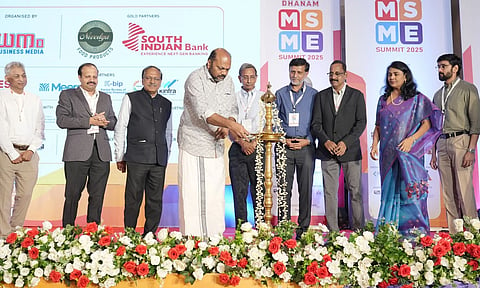

Micro, small and medium enterprises are the backbone of the country, and Kerala is at the forefront of MSME growth, said industries minister P Rajeeve while inaugurating the Dhanam MSME Summit 2025 organised by Dhanam Business Media.
Over the past few years, 3.5 lakh new MSMEs have been launched in Kerala. “These enterprises are our strength,” he noted, pointing out that the MSME loan amount, which stood at ₹48,000 crore in 2001, has now touched ₹1 lakh crore.
The minister added that seven lakh jobs have been generated through the government’s Entrepreneur Year scheme. To build further, the industries department is implementing the Mission 1000 initiative, aimed at scaling up 1,000 enterprises with subsidies on investment and loan interest. The goal: to enable each to reach an average turnover of ₹100 crore, collectively contributing to a ₹1 lakh crore economy for Kerala.
Kerala has also seen robust investor interest. At the Kerala Investors’ Meet, the state attracted commitments worth ₹1,90,000 crore. Of this, 25% has already been realised, compared to the national average of 10–15%.
Foundation stones have been laid for 98 projects, including the Adani Group’s seventy-acre logistics park. According to the minister, the aim is to realise 40% of the projects by January 2026. He added that the wider vision is to position Kerala as the “California of India.”
Kerala is making its presence felt in emerging fields such as graphics and generative AI. The state’s talent pool has grown by 172%, placing it 9th nationally. Reverse migration is another notable trend: nearly 40,000 professionals have moved back to Kerala in the past two months, according to LinkedIn profile changes. The real figures are expected to be higher.
To accommodate this influx, Kerala has hosted the country’s first GenAI Conclave and is preparing to introduce an ESG policy. Yet, challenges persist, with a perception that Kerala is a difficult place to do business. The minister countered this by noting that both the world’s largest blood bag manufacturer and Asia’s largest artificial tooth manufacturer operate from the state.
Entrepreneurs have also vouched for improved processes, saying that all permits to start a business can now be obtained online within seven days.
Since the Invest Kerala Summit, the local self-government department has amended over 100 rules to support entrepreneurs. Building regulations are also being eased, allowing businesses to operate from homes with up to 50% of the space converted for commercial use. Legislation is also being prepared to allow vacant houses to be fully used for business.
The minister explained that the K-Swift platform has made it possible to start a business in just two minutes. A deemed licence is valid for three and a half years, giving entrepreneurs time to secure the actual licence at any point. This, he suggested, is aimed at supporting highly skilled workers currently at home but eager to re-enter the workforce.
Kerala has finalised its Hi-Tech Manufacturing Framework and will host the Women Entrepreneurs Conclave on October 13 at the Hyatt, under the theme Our change is through women entrepreneurship.
On the industrial front, the minister said Kerala is the first among 12 corridor projects nationwide to acquire land and begin work. The tender for infrastructure development of Palakkad Smart City, the first node of the Kochi–Bengaluru Industrial Corridor, has been completed, with construction set to begin soon.
The Dhanam MSME Summit was held in partnership with the Thrissur Chamber of Commerce and the Thrissur Management Association, featuring keynote sessions and panel discussions on business growth.